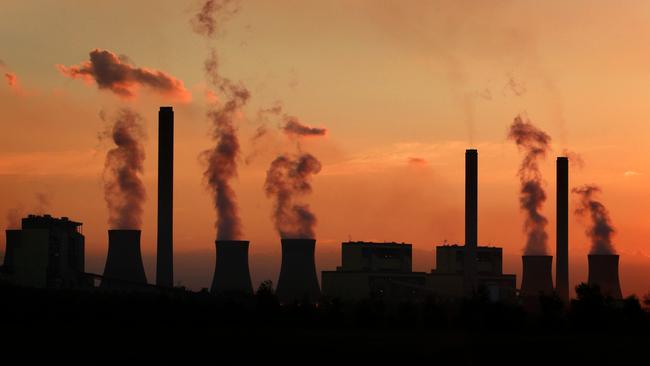Australian Competition & Consumer Commission investigation into price gouging
Energy companies face a consumer watchdog probe into any price gouging and anti-competitive conduct during the power crisis.

Energy companies face a consumer watchdog probe into any price gouging and anti-competitive conduct during the rolling national power crisis, with a report into the electricity market to be handed to energy ministers next month after a five-fold increase in wholesale electricity prices.
The Australian Competition & Consumer Commission investigation will examine energy companies’ profits and margins as part of a forensic audit into soaring energy bills linked to coal outages and Russia’s invasion of Ukraine.
The crackdown will lead a series of regulatory reviews into the energy crisis as the industry navigates high prices, supply shortages and reforms, including a capacity mechanism to secure longer-term baseload power.
While the Energy Security Board suggested coal and gas be included in its draft mechanism, Victorian Energy Minister Lily D’Ambrosio on Monday ruled out any supply payments to fossil fuel generators. “We have always been clear that a capacity market operating in Victoria would make payments to zero emissions technologies and not fossil fuels,” she said.
“We are leading the nation in renewable investment and job creation – our investment is delivering cheaper energy prices for Victorian households and businesses – while we work towards net-zero emissions by 2050.”
ACCC chair Gina Cass-Gottlieb, whom Jim Chalmers ordered to look into whether energy market rules had been breached, said the watchdog would “provide greater transparency around the factors influencing electricity and gas prices, including profits and margins from a wide range of energy companies”.
“In line with the Treasurer’s request, we will also assess and bring to the government’s attention any need for regulatory change to ensure electricity and gas markets function properly for the benefit of all Australian consumers,” Ms Cass-Gottlieb said.
The Australian Energy Market Operator last week suspended the national electricity market after it was forced to intervene and set price caps on both power and gas while blackout risks also threatened the system as generators refused to provide high-cost supplies at lower capped prices.
Anthony Albanese accused generators of essentially “gaming the system” while Australian -Energy Regulator chair Clare Savage suggested some generators were withholding supply to access higher payments.
Ms Cass-Gottlieb said rules were in place to stop energy generators manipulating the spot market by restricting supply to inflate prices and warned that the ACCC could penalise companies withholding electricity contracts.
“We will be closely watching market behaviour in coming months to ensure these rules are not being broken,” she said.
The Australian Energy Council, representing big energy retailers and generators in the market, said claims of power generators seeking to profiteer from recent market conditions were wrong.
Delta Electricity chief executive Greg Everett, who operates the Vales Point coal power station in NSW that supplies about 4 per cent of power in the national grid, welcomed the ACCC probe given the unprecedented intervention and high prices.
“A review is justified because when you have an event like this, you really do need to investigate it thoroughly because you don’t want these things happening again and you want to take steps to remedy that in the future,” Mr Everett said.
He said generators had been working to supply power for users but were conscious of -exhausting their own reserves. “It looks to me like all the major generators, wherever they’ve got supply, have been making them available for those morning and evening peaks,” he said. “But no one is fuelled to supply the market 24/7.”
Prior to the market suspension, a $300-a-megawatt hour cap was put in place to restore order following a prolonged period of unusually high wholesale prices. The cap was considered too low to cover costs for many companies, which meant generators withheld up to 5GW of generation to avoid running at a loss. AEMO then forced generators to supply the market through daily orders to avoid blackouts, creating a chaotic market and ultimately triggering the intervention.
Ms Cass-Gottlieb said the huge power price surge in the first two weeks of June was linked to international factors such as the war in Ukraine, the global gas crunch, a cold start to winter and reliance on ageing coal-fired power stations.
In a bid to avoid future energy crises, the Prime Minister on Monday pledged to fast-track a technology-neutral capacity mechanism requiring energy retailers to lock in reliable power supply in advance and drive investment across the electricity market.
Under the ESB draft design, coal and gas power stations along with renewables would receive payments to secure reliable supply and keep the ailing power system operating.
States and territories would decide their final energy mix.
Victorian Premier Daniel Andrews said while coal and gas would remain in the state’s energy mix until at least 2025 – before the mechanism starts – he wanted wind, solar and battery storage to “firm up and turn into baseload synchronous energy”.
With the Victorian government having agreed a secret financial deal with EnergyAustralia to prop up the giant Yallourn coal plant until 2028, critics say the state’s stance is at odds with deals it does with the private sector.
Energy Users Association of Australia chief executive Andrew Richards said: “It’s ironic the one state that’s come out to explicitly say no coal or gas has done a deal with Yallourn to stay on longer than Yallourn wanted to.
“The last couple of weeks have clearly demonstrated that if you start losing thermal capacity really quickly, bad things happen.”
Mr Everett said the Victorian government risked denting a much-needed national approach to fixing the energy crisis by excluding coal and gas.
NSW Energy Minister Matt Kean, who has pushed for a faster exit from coal power, said the Perrottet government would not be “ideological” about including coal and gas in its capacity mechanism design.





To join the conversation, please log in. Don't have an account? Register
Join the conversation, you are commenting as Logout